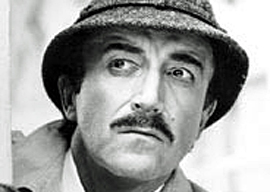
March 09, 2017

Peter Sellers as Inspector Clouseau
But one guy did respond: David Schraub, a lecturer in law and senior research fellow at the California Constitution Center, UC Berkeley Law School. Schraub wrote an op-ed for Haaretz titled “Trump’s anti-Semitic “False Flag” Allegation Is Dangerous (Or, how the “blame the Jews for their own victimization” conspiracist fringe is going mainstream conservative).” Everything in that title is wrong. Trump didn”t say “false flag,” he didn”t blame Jews, and suggesting that a hate crime is a hoax is not “conspiracist fringe,” but a good bet. I”ll admit, I didn”t much care for Schraub, based on that piece and a few other things I”d read (the dude actually defends “trigger warnings”). But the man stepped up to answer a few questions in a civil manner, and that’s admirable. Of all the people I reached out to, he’s the only one who wasn”t a coward. He deserves respect for that.
Schraub admitted that the quotation marks he put around false flag were not intended to signify an actual quote, but rather his interpretation of what Trump meant. He defended that interpretation: “”False flag” is a term of art for an operation that is secretly done for the benefit of the group that appears to be the victim.” Problem is, Trump didn”t tell the attorneys general Jews were doing it to benefit Jews. Schraub merely assumed he knew what Trump meant.
I asked Schraub, “Isn”t it true that, in the past, there have been many verified cases of hate-crime hoaxes, perpetrated by a variety of people for a variety of reasons?” His response:
Of course, in any sort of criminal activity there are cases of false reports””arsons” which turn out to be insurance fraud, “robberies” which cover up carelessly losing a precious item, and so on. Hate crimes no doubt also have their share, though again that share tends to be a small one. But when faced with a wave of arsons or robberies or other crimes we generally don”t”and shouldn”t”begin by talking of the “sometimes” when the claims are hoaxes, even though statistically we would be right some of the time. Doing so would come off as disrespectful to the victim whom (as an initial matter at least) is overwhelmingly likely to be nothing more than a straightforward victim.
Schraub added that when it comes to hate-crime hoaxes, “the salience we give them vastly outstrips the proportion of times they occur.” In response, I pointed out that in my experience, a hate-crime story will usually receive less attention if found to be a hoax, and I provided several examples (breathless coverage of Muslim’s motel burned by Islamophobes, tiny blurb when it was discovered that the Muslim set the fire himself; breathless coverage of gay man beaten and branded by Nazi homophobes; tiny blurb when it turned out the loser did it to himself). Schraub replied:
The relatively few hoax cases are more likely to become news because typically, the whole reason one perpetrates a hoax is to get attention and media coverage (to gin up sympathy or smear political opponents). It”d be kind of pointless to fake a hate crime against yourself and then tell nobody about it. Whereas in the genuine cases, it is far more likely that the victim may not have any interest in drawing further attention to themselves, and so those crimes are less likely to become major stories. My suspicion is that most hoax cases end up making the news because the faux-victim’s purpose is to create a news story.
Give that man a cigar with a trigger warning on the band! He’s 100% right. And, probably without meaning to, he bolstered my point about how journalists need to stop slobbering over every “hate crime” story that lands on their desk. Because indeed, hoaxers usually engineer their tall tales in order to receive the maximum amount of publicity. So reacting with suspicion to “hate crime” stories that seem too good to be true does not indicate that one is being (as Schraub claimed) “disrespectful to the victim.” It just indicates good common sense.
Common sense that Trump, God help us all, showed last week when he speculated about the Jewish community-center bomb threats. Whether that commonsense reaction was due to reasoning skills or just a “lucky shot” isn”t that much of a concern to me.
After all, I”d rather have a president who makes good calls by accident than one who seems to make bad calls on purpose (like Trump’s predecessor).